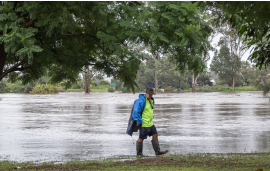After a disaster, you will want to confirm that your family and friends are safe. It may be difficult to make local phone calls, as phone lines may be damaged and there may be a larger volume of people trying to make calls.
You may not hear from anyone within the first several hours following a disaster, and it could take up to 24 hours or longer for a family member to get access to a phone line.
Tips for emergency communications
Before an emergency
- Ask a relative or friend who lives out-of-province to be your out-of-area contact. This person will be your "message board" after an emergency or disaster. Pick someone who is not on the West Coast.
- Print and complete an out-of-area contact card with your out-of-area contact's name and phone number for each family member to carry in their wallet, purse, or backpack.
- Put your out-of-area contact number in your cell phone's contact list. The stress of a disaster may make it difficult to remember phone numbers.
- Tell family and friends who live outside BC to call your out-of-area contact to share information about you and your family after a disaster.
During an emergency
If there is an emergency, start by contacting your out-of-area contact. Although local phone systems may be tied-up after a disaster, long distance circuits are often unaffected and can be used to provide updates and check on your loved ones.
Report how you are, where you are, or where you plan to be. Keep your calls short.
- Text instead of calling. A text message may get through even when the voice component of the cellular network is congested.
- Use email and social media. In recent disasters, email, Facebook, X (formerly known as Twitter), and other social media sites have proven to be excellent ways to communicate.
Take a closer look
Ready to prepare for emergency communications? Use the resources listed below to get started.
- "Stay Connected: Communicating During a Disaster" infographic from PreparedBC
- Emergency contact information cards
- PreparedBC's communication during disasters
- Government of Canada emergency communications





